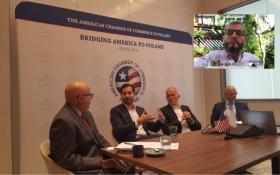- 16 września 2020
- Category: Bez kategorii

It has been just over six months since businesses first went into lockdown, resulting in a complete change in the market overnight. In recent months, every organization and sector has been tested in unprecedented ways. We discussed these changes during an online meeting led by AmCham’s Chairman Mr. Tony Housh and attended by representatives of the following companies: Boeing, Philip Morris, Procter and Gamble, and Uber.
All guest speakers agreed that we are now working in a new reality, with Covid-19 teaching us key lessons and bringing numerous challenges for the future.
Mr. Gabriel Ragy, CEO and Chairman of the Board at Procter and Gamble Polska, highlighted that his company encouraged its employees to work intensively and innovatively. Procter and Gamble also worked to find the right work-life balance for every employee in this new reality. He also brought up day-to-day work and the need to reorganize office space, which has changed from a bustling, crowded workplace to something more digital and dispersed.
Rafal Stepnowski, Director of Government Affairs at Boeing, also spoke of the “storm” his company is facing. He shared his comments on the downturn that hit the airline industry, calling it a permanent crisis. Despite these difficulties, the organization has switched to remote work and has not noticed a drop in quality or productivity.
Philip Morris, in turn, struggles with the challenges facing a company with a production and service center in our country, from where it serves 70 other locations within the group. Maintaining employment, adapting various solutions, and supporting processes in this enterprise on a global scale are currently the most critical for the tobacco industry. Mr. Wojciech Niewierko, Member of the Board of Directors of External Affairs in Poland and the Baltic States at the Philip Morris International, also spoke of the reconfiguration in daily work of the organization.
Covid-19 brought about a decrease in revenue of 90% for Uber; nevertheless, Mr. Mark Boris Andrijanic, Head of Public Policy, Central & Eastern Europe at Uber, predicts a promising future thanks to the strong recovery he sees in this region.
Looking ahead to the coming months, our guests stressed that demographics and labor mobility will continue to pose problems for Poland. Poland is witnessing demographic challenges that had begun before the pandemic, and labor mobility on the Polish market had long been one of the most impactful factors in determining economic growth.
Solutions to bring more employees into the labor market include enabling those who retired at an early age to return to the labor market, as well as creating flexible work arrangements for students. These issues are important in fostering a long-term flexible labor market, which is expected to be a pillar of the economy stimulated by the government.
Panelists said that businesses have passed through the first wave of the global crisis and we may now begin to predict the labor market of 2021. All disputants agreed that Covid-19 empowered organizations to act quickly, be more agile, and continuously evolve. Successful businesses will need to remain proactive in adapting to the new reality and new work mode, whether remote or mixed. The government is expected to assist in this adaptation process by redefining a variety of policies regarding self-employment, workplace safety rules, and immigration. These policies must be crafted to be conducive to economic growth and not a barrier to the development of new forms of work.
We are facing a new reality of living with the virus and it is well-known that local and global outbreaks will continue to disrupt the economy’s already fragile recovery. However, the Polish government has already proven its ability to respond quickly to these issues, including making crucial policy decisions regarding employment support and stimulus funds.
The new reality requires that particular attention be paid to maintaining an effective supply chain and key suppliers to guarantee the smooth functioning of business. This applies to all sectors, from industrial production, as in Philip Morris or Procter and Gamble, to consumer services, as in Uber.
Our guests touched on the consumer market during the final part of the meeting, pointing out that the devastating effects of Covid-19 on the economy and largely consumption-based GDP in the spring will be felt for some time to come. Procter and Gamble observed that consumers behaved spontaneously and often irrationally at the beginning of the pandemic, fearing a lack of essential products. The company was able to cut its inventories and adjust its supply chains to follow consumer demand and ensured that the continuous flow of goods could not be at risk.
The speakers stressed that Poland’s consumers are more resilient than in some other countries and have adapted relatively smoothly to the new normal. Now, confidence is back, and the speakers’ companies indicate more stability and dynamics in private spending.
No one knows how the next few months will play out, but the Covid-19 pandemic has brought very important lessons for everyone. Mr. Andrijanic from Uber emphasized that while most plans will need to change over time, planning is nevertheless the key to success. The pandemic’s disruption has not stopped companies from thinking ahead and preparing the groundwork for a series of exciting projects and innovations.
In the speakers’ closing remarks, Mr. Niewierko reiterated that the last months have been unrivaled times, testing the flexibility and resilience of businesses and individuals. Regular communication between regulators and the business community is critical to ensure short-term and long-term growth opportunities for businesses. Mr. Ragy stressed that Poland must attract and retain talent in order to ensure the country’s prosperity. Mr. Stepnowski concluded that these unprecedented times can challenge employee loyalty and engagement, making “the management of trust” critical to every company’s success.